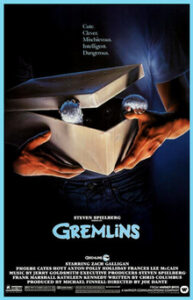Gremlins-1984
Director Joe Dante
Starring Zach Galligan, Phoebe Cates
Scott’s Review #1,443
Reviewed September 28, 2024
Grade: B+
A mishmash of film genres like black comedy, horror, and Christmas, Gremlins (1984) is one of the films responsible for the new Motion Picture Association of America (MPAA) rating of PG-13 introduced in the mid-1980s.
Too soft for an adult R rating but too scary for a PG rating many films fit better in the PG-13 category.
The film features a cute E.T. the Extra-terrestrial (1982) reminiscent creature named Gizmo. Since Steven Spielberg’s executive produced Gremlins, there are comparisons to the successful mega box office film.
But Gremlins is darker than E.T. especially when the spawn of Gizmo emerges in a fierce, aggressive manner and one dons a mohawk-style haircut. Many of the gremlins die and a few humans are killed by the gremlins giving it a scarier vibe.
This is thanks to director, Joe Dante, who gives the film a 1950s B movie style that offers a dark campy style.
A gadget salesman, Randall Peltzer (Hoyt Axton) is looking for a special Christmas gift for his son Billy (Zach Galligan) and finds one at a store in Chinatown. The shopkeeper is reluctant to sell him the “mogwai” but does and warns him never to expose him to bright light, or water, or feed him after midnight.
Naturally, when Randall returns to his home in the United States all of this happens and the result is a gang of gremlins that decide to tear up the town on Christmas Eve.
There are a couple of ways to view this film. The ‘message’ is a statement of the consumer culture running rampant in the 1980s. Wanting everything but not appreciating things is stated during the final scene.
The Chinese shopkeeper repossesses the “mogwai”, scolds the family for their negligence, and criticizes Western society for its carelessness with nature.
In a touching scene, Gizmo, having bonded with Billy, bids him goodbye. The touched shopkeeper concedes that Billy may be ready one day and, until then, Gizmo will be waiting.
Anyone with a pet will get a teary eye or two.
One can also view Gremlins as an entertaining popcorn flick with superior special effects and a fun story. The visual effects and the art direction are worth a pause for. Impressive are the sequences in the town where the stores and homes are perfectly dressed for the holidays.
The Christmas lights, trees, snow, and other trimmings provide feelings of warmth and spirit.
Galligan and Phoebe Cates who plays his love interest, Kate, have wonderful chemistry as a teen romance blossoms. This makes the audience more invested in their peril as they try to save the townspeople from doom.
Axton and Frances Mee McCain who plays Billy’s mother, Lynn, also are rootable. They are believable as a lovely suburban couple who have a wacky side.
Corey Feldman and Judge Reinhold appear in small roles as a friend and Billy’s obnoxious boss, respectively. Neither role is developed or necessary but familiar faces are always nice to see in cinema.
Polly Holliday nearly steals the show as the dog-hating Ruby Deagle. In a clear nod to Mrs. Gulch in The Wizard of Oz (1939) she sneers and snickers in an ill-fated attempt to have Billy’s dog destroyed.
Delightfully, she gets a death scene where the gremlins terrorize her to death when her stair chair goes wonky and throws her out a window. Holliday is a hoot and must have had a ball playing the villain.
Other stock characters like the disbelieving police force are cliched and only serve to hinder the actions of the main characters.
Gremlins (1984) is a darling film that holds up well. It’s mischievous without going full horror and can be enjoyed by the entire family on Christmas Eve. The quirky comedy elements and cool visuals make the film fun and impressive.

